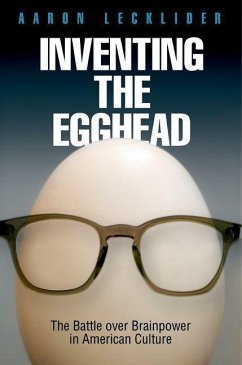Throughout the twentieth century, pop songs, magazine articles, plays, posters, and novels in the United States represented intelligence alternately as empowering or threatening. In Inventing the Egghead, cultural historian Aaron Lecklider offers a sharp, entertaining narrative of these sources to reveal how Americans who were not part of the traditional intellectual class negotiated the complicated politics of intelligence within an accelerating mass culture. Central to the book is the concept of brainpower-a term used by Lecklider to capture the ways in which journalists, writers, artists, and others invoked intelligence to embolden the majority of Americans who did not have access to institutions of higher learning. Expressions of brainpower, Lecklider argues, challenged the deeply embedded assumptions in society that intellectual capacity was the province of an educated elite, and that the working class was unreservedly anti-intellectual. Amid changes in work, leisure, and domestic life, brainpower became a means for social transformation in the modern United States. The concept thus provides an exciting vantage point from which to make fresh assessments of ongoing debates over intelligence and access to quality education. Expressions of brainpower in the twentieth century engendered an uncomfortable paradox: they diminished the value of intellectuals (the hapless egghead, for example) while establishing claims to intellectual authority among ordinary women and men, including labor activists, women workers, and African Americans. Reading across historical, literary, and visual media, Lecklider mines popular culture as an arena where the brainpower of ordinary people was commonly invoked and frequently contested.
Dieser Download kann aus rechtlichen Gründen nur mit Rechnungsadresse in A, D ausgeliefert werden.









